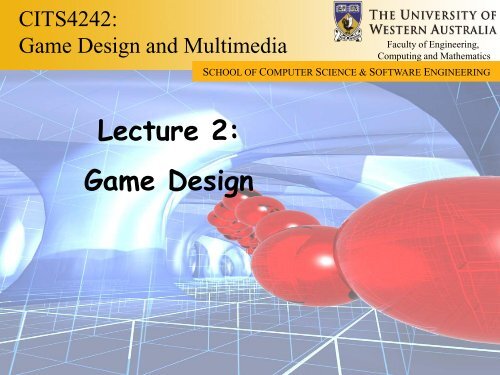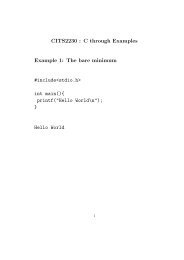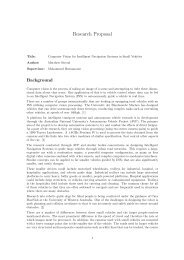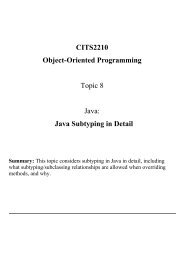Lecture 2: Game Design - Undergraduate
Lecture 2: Game Design - Undergraduate
Lecture 2: Game Design - Undergraduate
You also want an ePaper? Increase the reach of your titles
YUMPU automatically turns print PDFs into web optimized ePapers that Google loves.
CITS4242:<br />
<strong>Game</strong> <strong>Design</strong> and Multimedia<br />
Faculty of Engineering,<br />
Computing and Mathematics<br />
SCHOOL OF COMPUTER SCIENCE & SOFTWARE ENGINEERING<br />
<strong>Lecture</strong> 2:<br />
<strong>Game</strong> <strong>Design</strong>
What is <strong>Game</strong> <strong>Design</strong>?<br />
Faculty of Engineering,<br />
Computing and Mathematics<br />
SCHOOL OF COMPUTER SCIENCE & SOFTWARE ENGINEERING<br />
<strong>Game</strong> design includes developing and considering the following aspects of a game:<br />
- Concept<br />
- Genre<br />
- Setting (often including map/level design)<br />
- Characters<br />
- Premise and storyline<br />
- Audience and player motivation<br />
- <strong>Game</strong> mechanics and game play<br />
- Mood and atmosphere<br />
- Look and feel – graphics and sound
Common Genres<br />
Faculty of Engineering,<br />
Computing and Mathematics<br />
SCHOOL OF COMPUTER SCIENCE & SOFTWARE ENGINEERING<br />
There is a huge variety in computer games, but we can classify the majority of them:<br />
- Action/Shooter games<br />
- Emphasis on fast action and reflexes, shooting things (Doom, etc.)<br />
- Stealth games are similar, but with an emphasis on not being detected and being cunning.<br />
- Strategy games<br />
- Focus on planning, resource management<br />
- Can be either real-time strategy (RTS) and turn-based strategy (TBS)<br />
- Racing games<br />
- Sports<br />
- Adventure/Role playing<br />
- Arcade/Platform<br />
- Online games<br />
- There are many variants and combinations of these, and some games that don’t fit well.
So how do you design a game?<br />
Faculty of Engineering,<br />
Computing and Mathematics<br />
SCHOOL OF COMPUTER SCIENCE & SOFTWARE ENGINEERING<br />
Learning game design is not easy<br />
- It is roughly similar to learning to write fiction.<br />
- Most game designers say that the most important thing is to play many games.<br />
- And to keep a critical eye as you do.<br />
- What do you like? What not? What works well? Why?<br />
- Watching others play games and listen to their opinions is important too.
What do game designers recommend?<br />
Faculty of Engineering,<br />
Computing and Mathematics<br />
SCHOOL OF COMPUTER SCIENCE & SOFTWARE ENGINEERING<br />
The following is a collection of quotes from top game designers.<br />
- From “So You Wanna Be A <strong>Game</strong> <strong>Design</strong>er”, <strong>Game</strong>Spot<br />
http://au.gamespot.com/features/6129276/index.html<br />
- Four top game designers were interviewed:<br />
- Chris Avellone, Obsidian Entertainment<br />
- Cliff Bleszinski, Epic <strong>Game</strong>s<br />
- Ken Levine, Irrational <strong>Game</strong>s<br />
- Akira Yamaoka, Konami<br />
Levine: <strong>Game</strong> designers have a weird job. At root, it is their responsibility to ensure that a game is<br />
fun to play. The problem with being a game designer is "fun" is an extremely relative term. I<br />
remember playing Midnight Club 2 recently on the Xbox and thinking, "I could never design this<br />
game in a million years." I have no idea what makes sports games fun. But for some reason, I have<br />
some insight into what makes strategy games, shooters, and RPGs fun...probably because they're<br />
the kind of games I enjoy playing.
What do game designers recommend?<br />
(cont)<br />
Faculty of Engineering,<br />
Computing and Mathematics<br />
SCHOOL OF COMPUTER SCIENCE & SOFTWARE ENGINEERING<br />
Ken Levine: I remember being really surprised to learn about how technical game<br />
design was. A lot of people tell me: "I've got a great idea for a game." Frankly, who<br />
gives a crap? A great idea is meaningless. A great idea that leverages your existing<br />
technology, gets the team excited, is feasible to do on time and budget, is<br />
commericially competitive, and, last but not least, floats the boat of a major<br />
publisher... Now you have something.<br />
Avellone: We're working on Neverwinter Nights 2 right now (most everyone at<br />
Obsidian is, although we have 10-15 people working on our next project, which is not<br />
a sequel). The way design usually works is that we blue-sky a vision document for the<br />
game's key features and fun factor. Then we make it more realistic, turning it into a<br />
"creative design doc" that the programmers break down into a schedule.
What do game designers recommend?<br />
(cont)<br />
Faculty of Engineering,<br />
Computing and Mathematics<br />
SCHOOL OF COMPUTER SCIENCE & SOFTWARE ENGINEERING<br />
Bleszinski: Going from the original creative vision to what the game is eventually going<br />
to be…it isn't always about making the best game possible. It's about the tradeoffs you<br />
decide on as a designer. You're making the best game possible with x people, y months,<br />
and with z dollars. It's like playing an RPG where you have 20 points to allocate to<br />
strength, dexterity and intelligence. You can't have it all.<br />
You have to pick, what are the things you're going to do well in this game? There are<br />
three to five things we're going to do that no one has ever seen, that we're going to do<br />
better than anyone else, and commit to it. You start off with your grandiose design of<br />
what your first game in a new franchise is gonna be. And you have 800 million ideas.<br />
Ultimately you wind up with a fraction of them. If you have enough ideas, you've got<br />
plenty of material for the sequel. If you do a good enough job on the first game and<br />
establish the franchise, you'll have plenty of ideas for the rest of the games.
What do game designers recommend?<br />
(cont)<br />
Faculty of Engineering,<br />
Computing and Mathematics<br />
SCHOOL OF COMPUTER SCIENCE & SOFTWARE ENGINEERING<br />
Levine: <strong>Game</strong> development is an extremely iterative, collaborative process. A designer<br />
who sits off in a corner by himself writing a game design doc is going to be pretty<br />
shocked at the reaction he gets when he gives it to the team to "figure out." Great<br />
games are great because they leverage all the tools at hand: people, technology, design,<br />
art, etc.<br />
Yamaoka: We, the development team, hold meetings and spend a lot of time until we<br />
reach a consensus of opinion. We talk about everything from the promotional side of<br />
the game to very philosophical topics...like "crime and punishment," for instance, in<br />
Silent Hill 2. [We] discussed pain and anguish of a human being until everybody fully<br />
understood their part in the game development. My job is to make sure everything is<br />
shared within the team, from the theme of the game to individual opinions, so that the<br />
team can work efficiently. And this responsibility will continue until the game is<br />
complete.
What do game designers recommend?<br />
(cont)<br />
Faculty of Engineering,<br />
Computing and Mathematics<br />
SCHOOL OF COMPUTER SCIENCE & SOFTWARE ENGINEERING<br />
• Chris Avellone: Well, technology facilitates design and storytelling. Just like design,<br />
there are only so many programming resources to devote to tackling design issues, so<br />
you have to choose your battles and scale back your design so it falls within the<br />
technology requirements for your platform (console or PC) and your programming<br />
resources (it's great to have a 50-page spec on how radiation will work in a game, but<br />
it's much better if you leverage the existing code for poison and save the programmers<br />
two weeks of work).<br />
• Also, there's the temptation to throw every fun element you can think of into a game,<br />
and this just isn't feasible. You need to use all your programming assets to reinforce the<br />
fun factor and the key design elements of your game (preferably combat and gameplay),<br />
or focus on tools that allow more people (especially nonprogrammers) to implement<br />
content without taking programmers down.
What do game designers recommend?<br />
(cont)<br />
Faculty of Engineering,<br />
Computing and Mathematics<br />
SCHOOL OF COMPUTER SCIENCE & SOFTWARE ENGINEERING<br />
Bleszinski: I've really seen the value in iteration. Fun is the sum of its parts. It's hitting<br />
the button and feeling the responsiveness and seeing your character move and jump. It's<br />
pulling the trigger and seeing the nice muzzle flash. It's seeing the enemy react when<br />
you shoot him. It's seeing the enemy react to the fact that you're trying to shoot him<br />
and seeing the AI dynamically adjust. All these things coming together.<br />
Levine: I've grown to trust those around me more. I remember I once heard a designer<br />
say that he wished they had a machine that could literally transform thoughts and ideas<br />
into game designs. To me that would defeat the purpose of working in games:<br />
collaboration.<br />
The market has also changed. Certain genres that were around when I got my start are<br />
pretty much gone now, and new ones have evolved. <strong>Game</strong> designers who don't<br />
obsessively play games are not game designers.
What do game designers recommend?<br />
(cont)<br />
Faculty of Engineering,<br />
Computing and Mathematics<br />
SCHOOL OF COMPUTER SCIENCE & SOFTWARE ENGINEERING<br />
Yamaoka: My approach has changed from creating a traditional "video game" method to creating<br />
content on an interactive media system. In today's world of gaming, the range of age and type of<br />
players has broadened, so greater creativity is required from the game designer. One single<br />
approach will not be enough. You have to go beyond the traditional approach of creating video<br />
games [by], for instance, making it into a joint project with other media, like with film and music.<br />
Chris Avellone: I enjoy working on RPGs, hands down, mostly because the story and world and<br />
characters have a higher importance than many other games (this trend is changing, however).<br />
Any genre is generally cool: sci-fi, fantasy, postholocaust. I've worked on them all and enjoyed<br />
them. I wouldn't mind doing a modern-day RPG, however.<br />
I think it's more likely you'll be working on licensed properties in the industry than original<br />
intellectual properties. Obsidian's been lucky in the licenses we've been able to work with<br />
(Neverwinter and KOTOR2), and licenses carry the advantage of having a tone, world, and<br />
parameters established for you from the outset. The advantage of IPs is you have your own<br />
sandbox to play in, and the approval process is your own.
What do game designers recommend?<br />
(cont)<br />
Faculty of Engineering,<br />
Computing and Mathematics<br />
SCHOOL OF COMPUTER SCIENCE & SOFTWARE ENGINEERING<br />
Yamaoka: The skill to communicate with others is very valuable, because you have to<br />
cooperate with a lot of people to finish a project. Creators often have egos that they<br />
need to control in order to go in the same direction with the team. Also, being aware of<br />
content on other media is helpful as a game creator.<br />
Bleszinski: You need to understand most of the disciplines that are involved. You need<br />
to be an avid game player. You need to be a big picture guy, as far as paying attention to<br />
pop culture and relationships, and life, in general. Real life experience does make you a<br />
better game designer. If you go skydiving or scuba diving that will make you a better<br />
game designer.
What do game designers recommend?<br />
(cont)<br />
Faculty of Engineering,<br />
Computing and Mathematics<br />
SCHOOL OF COMPUTER SCIENCE & SOFTWARE ENGINEERING<br />
Levine: I wouldn't count on lucking out like I did. The way into game development is very clear,<br />
however: QA. Get a job in quality assurance. Unlike most industries, the gaming equivalent of<br />
"starting in the mailroom" actually puts you in the thick of the action. There is no better way to<br />
get an understanding of what makes games tick. There's no better place to observe design<br />
elements that read brilliantly on paper but turn into crap when they hit the screen (which happens<br />
more often than not). And there's no better place to figure out how to fix those design elements<br />
when everything goes pear-shaped.<br />
In terms of skills and personality, I'd suggest the following:<br />
Learn how to write a document. I generally structure all my docs in a reverse-pyramid style. I start<br />
at the top, with a single sentence: "Freedom Force is a real-time heroic tactical RPG which allows<br />
players to grow and manage their own team of superpowered heroes." Then I expand that<br />
thought out to a paragraph. Then a page. Then two pages. And so on. Write a document<br />
assuming that no one cares what you have to say. The reader is not in your head. They will not<br />
come to you. You have to bring it to them. How? Be clear. Be concise. Be entertaining. Keep<br />
your concepts based on things they understand and relate to. And, for God's sake, watch those<br />
proper nouns. Nobody ever liked a game design document because the designer had worked out<br />
the family tree of the villain back 27 generations.<br />
And play a lot of games. Even bad ones. In fact, especially the bad ones. If you can't find one useful<br />
idea from every game you play, you're not looking hard enough.

















